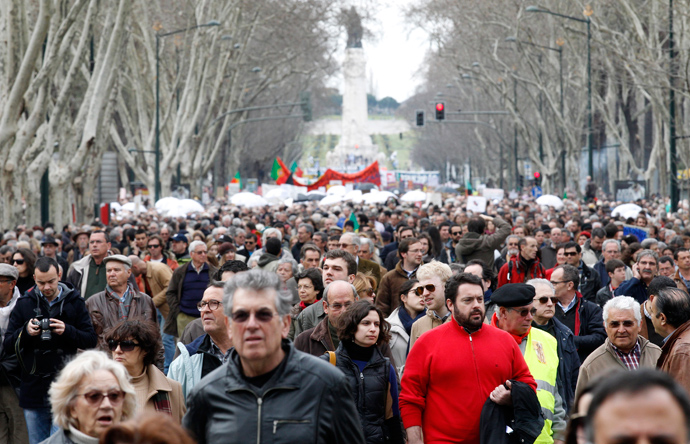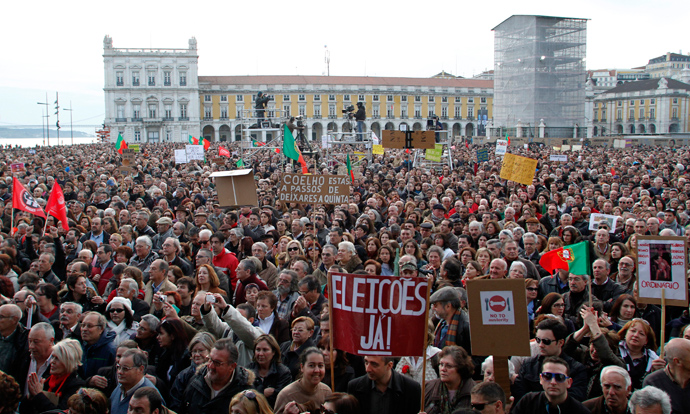

Portugal “Que Se Lixe a Troika”
Portugal “Que Se Lixe a Troika”
Comments
Portugal: “I Prefer the Horses in My Lasagne to the Donkeys in the Government”
On Saturday, 2 March 2013, “Que Se Lixe a Troika” (Fuck the Troika) demonstrations represented a qualitative as well as quantitative shift for the anti-austerity movement in Portugal. In more than 40 towns and cities across Portugal, 1.5 million people (800,000 in Lisbon) took to the streets against the government's slavish submission to the dictates of the Troika of IMF, ECB, and EU. In the wake of the first “Que Se Lixe a Troika” demonstration on 15 September, an ongoing militant dockers' strike, and a general strike on 14 November of last year, Saturday's demonstration is starting to tackle the unfinished business of the 1974 Portuguese Revolution.
Portugal's rulers are trembling. In the run-up to the demonstration on Saturday, the Lisbon City Council removed all loose cobblestones along the demonstration route in the city center. This comes after protests have been steadily radicalizing in the course of a few months. Clashes between police and protesters in front of parliament, revolutionary murals going up in city centers, protesters piling up rubbish in front of banks, and government ministers being insulted by the public are commonplace in Portugal 2013.
Students at the ISCTE University in Lisbon hit the headlines in recent weeks when they heckled Deputy Prime Minister Miguel Relvas in front of live television cameras and forced Relvas to flee the building while students sang the revolutionary anthem “Grândola, Vila Morena.” The action resonated with millions of people glued to their TV screens as Relvas has been under attack for obtaining his university degree from a private university in a matter of a year.
Greek-Style Austerity
Once labeled “the good pupil of the Eurozone,” Portugal is quickly turning into a Greek-style laboratory of austerity and neoliberalism. Unemployment now stands at 17.5 per cent with one and a half million people out of work. According to Eurostat figures about 24 per cent of the Portuguese population live below the poverty threshold. The economy is estimated to contract by two points this year. While this manifests itself in a sharp drop in domestic consumption the continued instability of the Eurozone adds fuel to the flames. Cuts to healthcare and the welfare state as well as diminishing purchasing power is making life unbearable for millions of Portuguese people.....
QUE SE LIXE A TROIKA 2/3/2013
Thanks, epaulo.
I remember that huge square and area from the '60s, when (not in public) groups of young people sang Os Vampiros. (vampires)
Eles comem tudo, comem tudo, comem tudo e nao deixam nada. Still fits.
Zeca Afonso vive.
He wrote Grandola, Vila Morena, too. People came through singing it, in the video. I didn't know it, because he presented it in '72, big deal in 74, when I was on down the road and out of touch. Just found the lyrics and history in wiki, important song indeed. And lovely.
Zeca sings it
http://www.youtube.com/watch?v=gaLWqy4e7ls or with recent crowd shots
People sang it to interrupt the prime minister (Pedro Passos Coelho/Peter... Rabbit) in February 2013
Amalia sang it, Joan Baez sang it, there's a vid of people in a square in Spain with instruments and singing, it's everyone's and the Portuguese people are singing it again,
and Zeca lives!
ps small animal surnames usually mean that one's ancestors fled the inquisition, and up in the mountains, took names like rabbit and mouse. Their families have used these names for centuries since. Mine means a tiny mountain goat.
..and thank you margot. i was wondering what they were singing. it's good to know.
..the left bloc has created a page in english
In this article, we shall present information which allows the reader to get a clear picture of how and in which political climate the Left Bloc was founded and how it has developed.
Why was the decision taken to launch a new organisation instead of an alliance or coalition? How was it done? How did the former organizations relate to this process? Did they fuse in the Left Bloc? How do you become a member? How is the leaderships elected? Who chooses the comrades who will eventually become MPs or councillors if they are elected? What does our parliamentary work look like? How do we use our strong presence in Parliament? What does our political and social work outside Parliament look like? Do we define ourselves as Anti-capitalists? How do we relate with other political forces on the left? Are we clear about forming government with the social democracy or not? Which were the most difficult and decisive difficult choices the Left Bloc had to face?...
Thank you for this...an intriguing exploration of the roots of an attempted alternative movement/ party...something which recalls the day when the greens in its innocence likewise tried such a process, until aborted by the ¨realists¨, those willing to play with the system of political correctness.
But I fear for its success...unless the movement extends to the rural areas and works with the people on the land, the base of any real alternative!
Women who conquered macho world of Portuguese politics prepare for power
A few days after Bloco de Esquerda (Left Bloc) won 10% of the vote in the Portuguese general elections last month, Joana Mortágua strode through the marble halls of the Portuguese parliament.
Mortágua doesn’t resemble most deputies: she doesn’t wears suits, preferring a T-shirt and sneakers. She’s athletic and gathers her hair into a ponytail. Even after a historic result, she looked relaxed and amused, joking with colleagues that she had too many meetings to go to. Fast-forward a few weeks and her diary is fuller; Mortágua has become one of the most powerful politicians in the country.
Bloco de Esquerda, Portugal’s equivalent to Greece’s anti-austerity Syriza party, is a crucial element in a leftwing alliance which is set to deliver a socialist government. Its sudden rise is also the story of a remarkable turnaround in fortunes which, in a notoriously macho political culture, has been masterminded by four women: the Bloc’s leader, Catarina Martins, deputies Mortágua and her sister Mariana, and Euro-deputy Marisa Matias.
During the past year the quartet have confronted corrupt bankers and businessmen in parliament and won major debates in a country where women are left out of most politics....
Inspiring women. I wish Canada had such a party.
..very refreshing conversation re learning lessons from what happened in greece.
The World Today - Left Unity in Portugal
video
Tariq Ali talks to Catarina Principe, and activist from Left Bloc in Portugal, about the the potential future government which may consist of an alliance between the Socialist Party, the Left Bloc, the Portuguese Communist Party and the Greens.
Portuguese budget restores the meaning of ‘left’ in Europe
The government led by socialist António Costa and supported in parliament by the radical Left Bloco de Esquerda (BE) and Partido Comunista Português (PCP) presented the 2017 budget law Friday night (Orçamento do Estado – 2017 OE). We are only at the beginning of an obstacle-strewn path, and yet, in spite of everything and contrary to all predictions, the majority continues to hold.
Portugal’s government is now probably one of the few in Europe to give a practical meaning to the concept of the left. And what does it mean to implement left policies? Well, it started by increasing pensions. For those receiving up to €838, there will be an adjustment based on inflation. For those under the threshold of €638, the increase will be €10. For sure, it is not much, but it’s still a figure above inflation, for a total of €120 per year.
Other income support measures will be implemented through a series of indirect measures such as increasing investments in health by 3.7 percent, education (for example, with free elementary school textbooks) and an increase in unemployment benefits. In addition, the IRS (personal income tax) surcharge introduced during the Troika years will be abolished. Its rates range from 1-3 percent.
The room for maneuvering is obviously very narrow, and in spite of the term “radical,” the socialist allies are showing enormous pragmatic and mediation skills. The criteria imposed by the European treaties should be respected; unfortunately we are not faced with a case of insubordination, but with the concrete demonstration that the austerity burdens can be redistributed in different forms. There is nothing revolutionary about it....
People sang it to interrupt the prime minister (Pedro Passos Coelho/Peter... Rabbit) in February 2013
Watch the sign language interpreter's reaction to the song, starting at about :37 in the clip. She is obviously moved by the song, struggles to maintain her composure and keep interpreting the debate, and at about 1:07, runs out of the shot in tears.






Comments
Do
Don't